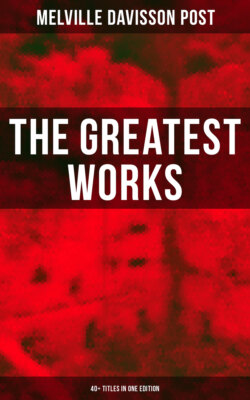Читать книгу The Greatest Works of Melville Davisson Post: 40+ Titles in One Edition - Melville Davisson Post - Страница 24
На сайте Литреса книга снята с продажи.
VII.
ОглавлениеTable of Contents
The Attorney General took the papers and went over them rapidly. "Well," he said, "there is nothing wrong with the application. Everything is regular except the affidavit, and it is quite clear that it fails to support this charge of felony."
"I was inclined to that opinion," said the Governor, "and I thought best to submit the matter to you."
"It is usual," continued the Attorney General, "to grant the application without question, where the papers are regular and the crime is charged, and it is not required that the crime be charged with the legal exactness necessary in an indictment. The Governor is not permitted to try the question whether the accused is guilty or not guilty. Nor is he to be controlled by the question whether the offence is or is not a crime in his own State, the question before him being whether the act is punishable as a crime in the demanding State. The Governor cannot go behind the face of the papers nor behind the facts alleged to constitute a crime, and if these facts, by any reasonable construction, support the charge of crime, the extradition will usually be granted. But it is a solemn proceeding, and one not to be trifled with, and not to be invoked without good cause, nor to be used for the purpose of redressing civil injuries, or for the purpose of harassing the citizens; and where on the face of the affidavit it is plainly evident that no crime has been committed, and that by no possible construction of the facts stated could the matter be punishable as a crime, then it is the duty of the Governor to refuse the extradition.
"In this case the authorities in the demanding State have filed an affidavit setting forth at length the facts alleged to constitute a felony. This paper shows substantially that a general partnership was formed by William Harris and Thomas Woodford, and that pursuant to such business relations certain partnership property came into the possession of Harris; this property he converted to his own use. It is clear that this act constituted no crime under the statutes of West Virginia or the common law there obtaining. The property was general partnership property; the money taken was a general partnership fund, subject to the check of either partner. The partner Harris was properly in possession of the cattle as a part owner. He was also lawfully entitled to the possession of the partnership fund if he saw fit to draw it out and use it. If it be presumed that his story of the robbery is false, and that he deliberately planned to secure possession of the property and money, and did so secure possession of it, and converted it to his own use, yet he has committed no crime. He has simply taken advantage of the trust reposed in him by his partner Woodford, and has done none of those acts essential to a felony. The application must be refused."
"That was my opinion," said the Governor, "but such a great wrong had been done that I hesitated to refuse the extradition."
"Yes," answered the Attorney General, "all the wrong of a serious felony has been done, but no crime has been committed. The machinery of criminal jurisprudence cannot be used for the purpose of redressing civil wrong, the distinction being that, by a fiction of law, crimes are wrongs against the State, and in order to be a crime the offence must be one of those wrongs described by the law as being against the peace and dignity of the State. If, on the other hand, the act be simply a wrong to the citizen and not of the class described as being offences against the State, it is no crime, no matter how injurious it may be or how wrongful to the individual. The entire transaction was a civil matter resulting in injury to the citizen, Woodford, but it is no crime, and is not the proper subject of an extradition."
The Governor turned around in his chair. "James," he said to his private secretary, "return the application for the extradition of William Harris, and say that upon the face of the papers it is plainly evident that no crime has been committed."
The blow which Fate had sought to deliver with such malicious cunning against the confidential clerk of Beaumont, Milton, & Company had been turned aside, and had fallen with all its crushing weight upon the shoulders of another man, five hundred miles to westward, within the jurisdiction of a distant commonwealth.
